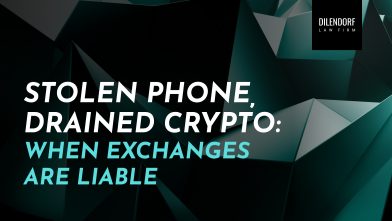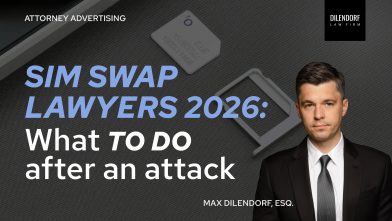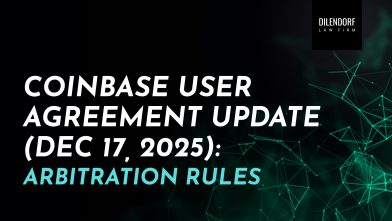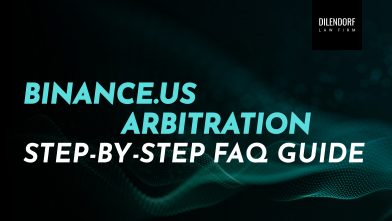Step-by-Step Coinbase Arbitration FAQ Guide
When a Coinbase exchange account is compromised, victims often feel helpless — the platform is slow to respond, funds disappear quickly, and there’s no way to “reverse” a blockchain transaction.
But Coinbase’s User Agreement provides a clear legal path to pursue claims.
This guide walks you through every stage — from filing your initial support ticket to submitting a formal complaint and, if needed, pursuing your claim through the next level of dispute resolution.
-
Can I sue Coinbase in court after my account is hacked?
No. Coinbase’s User Agreement requires disputes to be resolved through binding arbitration, not through state or federal court (with very limited e xceptions).
Appendix 5: Arbitration Agreement
“You and we agree to arbitrate all Disputes in binding arbitration except for the following types of Disputes […]”
In other words:
- You can’t sue Coinbase in court for most hacking-related claims.
- You waive your right to a jury trial.
- You can’t join a class action.
Most hacked-account claims must go through AAA (American Arbitration Association) or JAMS.
-
What should I do first if my account is hacked?
Your first step is to notify Coinbase immediately by filing a support ticket through their help center: help.coinbase.com.
Section 7.1: “If you have feedback, or general questions, contact us via our Customer Support webpage at https://help.coinbase.com.”
This ticket:
- Documents the incident.
- Creates a case number, which is required for the next stage.
- Shows you acted promptly after discovering the hack.
Include as much detail as possible: date and time of the incident, transaction IDs, wallet addresses, suspicious activity, and any phishing or SIM-swap details if applicable.
-
What is the Formal Complaint process and why is it required?
Before filing any arbitration claim or small claims action, you must complete the Formal Complaint process.
Section 7.2:
“If we cannot resolve the dispute through Coinbase Support, you agree to use the Formal Complaint Process set forth below before filing any arbitration claim or small claims action as described further in Appendix 5 below. You must complete the Formal Complaint Process before filing any arbitration or small claims action. If you do not complete it, then you agree that your claim or action must be dismissed from arbitration or small claims court.”
How to file a complaint:
Submit the complaint online using Coinbase’s complaint form.

Section 7.2.1:
“In the event that the dispute is not resolved through your contact with Coinbase Support, you agree to use our complaint form to describe your dispute, how you would like us to resolve the complaint, and any other relevant information.”
Include your support case number, a short description of the hack, the amount stolen, the resolution you seek, and any supporting documents.
Check out our step-by-step guide: How to Give Notice to Coinbase: Formal Complaint Guide
-
How long does Coinbase have to respond to my complaint?
Coinbase has 45 business days to respond to your complaint.
Section 7.2.1:
“The Formal Complaint Process is completed when Coinbase responds to your complaint or forty-five (45) business days after the date we receive your complaint, whichever occurs first.”
If Coinbase doesn’t resolve the issue after this period, you can proceed to arbitration or small claims court.
-
What are my options if Coinbase doesn’t resolve my complaint?
If Coinbase doesn’t resolve your dispute within the 45-day complaint period, you have two options:
- File a claim in small claims court — but only if your claim meets the court’s jurisdictional limits and remains in small claims court.
- Proceed to binding arbitration — which applies to most hacked-account cases.
Appendix 5:
“You and we agree to arbitrate all Disputes in binding arbitration except for the following types of Disputes: […] Disputes that are within the jurisdiction of a small claims court. You and we agree that if a Dispute could be brought in a small claims court in the county or parish in which you reside, then it must be brought in that small claims court, not arbitration, provided that it remains in that court and is not removed or appealed to a court of general jurisdiction.”
Most hacking-related disputes involve amounts above small claims limits or become too complex for small claims court, so arbitration is the more common route.
-
How do I file an arbitration claim against Coinbase?
Once the 45-day complaint period has passed and your issue remains unresolved, the next step is to formally file for arbitration.
It starts with completing the AAA Consumer Arbitration Demand Form through adr.org.
Your arbitration demand must include all applicable claims and adhere to the statute of limitations. Missing critical details or deadlines could weaken or void your case.
Appendix 5:
“You and we agree that arbitration under this Arbitration Agreement will, depending on the circumstance, be administered by the American Arbitration Association (‘AAA’) subject to the AAA’s Consumer Arbitration Rules then in effect, except as modified by this Arbitration Agreement. If the AAA is unable or unwilling to administer the arbitration […] you and we agree that JAMS will administer the arbitration.”
This marks the official beginning of the arbitration process. From here, the case moves forward according to the schedule set by the arbitrator.
-
How much does it cost to file an arbitration claim against Coinbase?
Filing an arbitration claim involves a consumer filing fee, which is typically capped at $225 under the AAA Consumer Arbitration Rules.
Coinbase covers the remaining administrative and arbitrator costs, so customers are only responsible for this initial filing fee. Once your claim is submitted, a neutral arbitrator is appointed, and both parties attend a virtual scheduling conference to set deadlines and outline the next steps in the case.
This process ensures the arbitration remains accessible and cost-effective for individual claimants.
-
How long does the arbitration process usually take?
Arbitration isn’t resolved overnight. It typically unfolds over several months — often around 9 to 12 months from filing to decision.
-
Do I need a lawyer to file arbitration against Coinbase?
You’re not required to hire a lawyer, but Coinbase will have legal counsel representing it in arbitration. Having an attorney can make a big difference — they’ll make sure your complaint and arbitration demand meet Coinbase’s procedural requirements, help you gather and organize evidence, and handle all filings and deadlines.
-
How does Coinbase limit its liability?
Coinbase’s Section 8.2 places strict limits on damages:
“IN NO EVENT SHALL COINBASE […] BE LIABLE (I) FOR ANY AMOUNT GREATER THAN THE VALUE OF THE SUPPORTED DIGITAL ASSETS ASSOCIATED WITH YOUR DIGITAL ASSET WALLET AT THE TIME OF THE EVENT […] OR (II) FOR ANY LOST PROFITS, LOSS OF GOODWILL, LOSS OF DATA, DIMINUTION IN VALUE OR BUSINESS OPPORTUNITY, ANY SPECIAL, INCIDENTAL, INDIRECT, INTANGIBLE, OR CONSEQUENTIAL DAMAGES […]”
This means your recovery is generally capped at the value of the stolen crypto at the time of the hack. Coinbase will also argue it isn’t responsible for “glitches,” “bugs,” or third-party actions. A strong legal strategy anticipates these defenses.
Contact Us
If your crypto was stolen from Coinbase exchange and you’re ready to take action, we can help you file your claim, prepare your evidence, and navigate the arbitration process.
With over six years of experience and a record of handling more than 100 consumer arbitration cases, our firm has pursued claims against major cryptocurrency exchanges as well as leading phone carriers such as Verizon, T-Mobile, and AT&T.
Our attorneys are experienced in navigating proceedings before AAA, JAMS, and NAM, and understand the procedural and strategic nuances that can make or break a case. We also represent victims whose assets were stolen not only from regulated exchanges but also from self-custody wallets like MetaMask and other decentralized platforms.
Reach out to us today to discuss your case and legal options: (212) 457-9797 | info@dilendorf.com.
Attorney Advertising. Prior results do not guarantee a similar outcome. This information is provided for educational purposes and is not legal advice.







